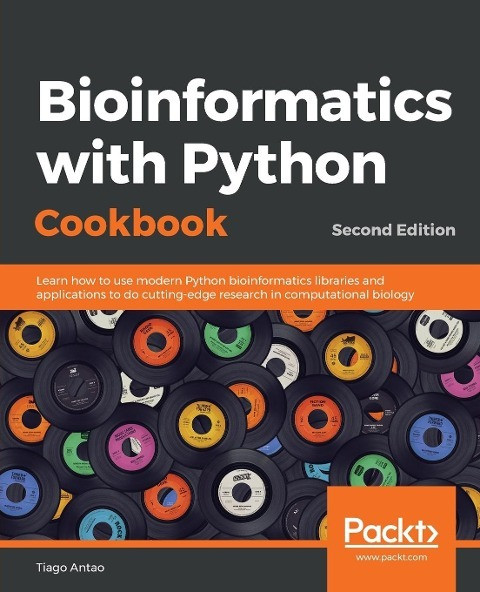
Bioinformatics with Python Cookbook - Second Edition
Kurzinformation
inkl. MwSt. Versandinformationen
Lieferzeit 1-3 Werktage
Lieferzeit 1-3 Werktage

Beschreibung
Discover modern, next-generation sequencing libraries from Python ecosystem to analyze large amounts of biological data Key Features:Perform complex bioinformatics analysis using the most important Python libraries and applications Implement next-generation sequencing, metagenomics, automating analysis, population genetics, and more Explore various statistical and machine learning techniques for bioinformatics data analysis Book Description: Bioinformatics is an active research field that uses a range of simple-to-advanced computations to extract valuable information from biological data. This book covers next-generation sequencing, genomics, metagenomics, population genetics, phylogenetics, and proteomics. You'll learn modern programming techniques to analyze large amounts of biological data. With the help of real-world examples, you'll convert, analyze, and visualize datasets using various Python tools and libraries. This book will help you get a better understanding of working with a Galaxy server, which is the most widely used bioinformatics web-based pipeline system. This updated edition also includes advanced next-generation sequencing filtering techniques. You'll also explore topics such as SNP discovery using statistical approaches under high-performance computing frameworks such as Dask and Spark. By the end of this book, you'll be able to use and implement modern programming techniques and frameworks to deal with the ever-increasing deluge of bioinformatics data. What you will learn:Learn how to process large next-generation sequencing (NGS) datasets Work with genomic dataset using the FASTQ, BAM, and VCF formats Learn to perform sequence comparison and phylogenetic reconstruction Perform complex analysis with protemics data Use Python to interact with Galaxy servers Use High-performance computing techniques with Dask and Spark Visualize protein dataset interactions using Cytoscape Use PCA and Decision Trees, two machine learning techniques, with biological datasets Who this book is for: ¿This book is for Data data Scientistsscientists, Bioinformatics bioinformatics analysts, researchers, and Python developers who want to address intermediate-to-advanced biological and bioinformatics problems using a recipe-based approach. Working knowledge of the Python programming language is expected. von Antao, Tiago
Produktdetails

So garantieren wir Dir zu jeder Zeit Premiumqualität.
Über den Autor

- Hardcover
- 316 Seiten
- Erschienen 2013
- Springer

- Taschenbuch
- 544 Seiten
- Erschienen 2018
- Packt Publishing

- paperback
- 274 Seiten
- Erschienen 2015
- Packt Pub Ltd

- hardcover
- 528 Seiten
- Erschienen 2021
- Wiley

- Hardcover
- 252 Seiten
- Apress

- Hardcover
- 288 Seiten
- Erschienen 2024
- ISTE LTD

- Hardcover
- 436 Seiten
- Erschienen 2010
- Springer

- Gebunden
- 1168 Seiten
- Erschienen 2015
- Blackwell Pub

- paperback
- 387 Seiten
- Erschienen 2021
- CABI Publishing

- Hardcover
- 352 Seiten
- Erschienen 2000
- Oxford University Press

- Gebunden
- 24 Seiten
- Erschienen 2010
- Springer

- Hardcover
- 605 Seiten
- Erschienen 2020
- Apress

- Hardcover
- 372 Seiten
- Erschienen 2008
- Packt Publishing




 bestellen
bestellen
























